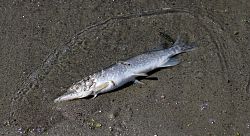

Testing carried out as part of Earthwatch's Great UK WaterBlitz in September, uncovered a 'cocktail of chemicals and stimulants' in UK rivers that is endangering aquatic life.
The Great UK WaterBlitz is a biannual campaign ran by the charity Earthwatch. Volunteers get involved over the duration of the campaign to undertake water testing of their local freshwater - rivers, streams and lakes, with kits supplied by Earthwatch. They then collate the findings and use them to build a national picture of water quality across the UK.
Between 20 - 23 September, over 4,531 volunteers got involved in the Great UK WaterBlitz, testing their local freshwater sources and gathering 2,338 datasets.
Testing of these datasets found worrying findings.
61% of fresh waters in the UK were ruled to be in a 'poor' state because of high levels of the nutrients phosphate and nitrate, caused by sewage effluent and agricultural runoff.
The worst country was England where 67% of freshwater samples had high levels of nitrate and phosphate present.
43% of freshwater sources were found to be in a 'poor' state in Northern Ireland, and 29% in Scotland and 21% in Wales.
By river basin, the Anglian and Thames had the worst water quality in the UK, with over 80% of surveys showing unacceptable nutrient concentrations.
Acceptable water quality was judged in alignment with the Environment Agency's values, this is where nitrates are under 1 part per million (ppm), and phosphates under 0.1 ppm.
Eartwatch sent 91 of the samples for further testing at Imperial College London for the presence of chemicals. This testing is still ongoing, but preliminary findings have found that UK rivers contain toxic pollutants including nicotine, antidepressants, antibiotics and painkillers and even caffeine. The main source of these will come from sewage at water company treatment works.
Sasha Woods, head of policy at Earthwatch, commented:
"Caffeine was present in 100% of samples sent to Imperial. This is alarming because it shows either that sewage effluent is not being cleaned properly by water companies before being discharged into rivers, or that too much raw sewage is going into rivers, or both of those things."
She expressed a great deal of concern over the terrible state of the UK's freshwater ecosystems, adding it was truly 'shocking' the levels of chemicals found in UK rivers. This shows that these are failures to deal adequately with sewage.
Earthwatch said: "Our rivers have been historically stressed by farming and are being pushed to the brink by outdated and inadequate sewage treatment works."
They argue for the importance of improvements to wastewater treatment processes and reductions in agriculture and urban run off.
Lots of the chemicals found in the datasets tested are at levels which pose risk to aqautic life. Some shocking statistics include:
A full analysis and report into the Great UK WaterBlitz September findings will be published next year.
Deputy director for water analysis and reporting for the Environment Agency, Owen Lewis, said: "The Environment Agency values the contribution of England’s growing network of citizen scientists and welcomes the Great UK WaterBlitz and other initiatives that complement our own research, monitoring and assessment work.
"We are absolutely committed to improving water quality, which is why we are pleased to be working closely with Earthwatch to target research and help find solutions to the complex problems water is facing."
For more information (and if you're interested in getting involved in the Great UK WaterBlitz next year), see: